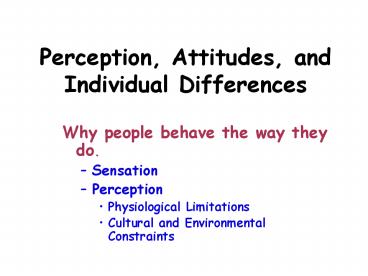Perception, Attitudes, and Individual Differences - PowerPoint PPT Presentation
1 / 10
Title:
Perception, Attitudes, and Individual Differences
Description:
Why people behave the way they do. Sensation Perception Physiological Limitations Cultural and Environmental Constraints Basic Internal Perceptual Organizing Patterns ... – PowerPoint PPT presentation
Number of Views:188
Avg rating:3.0/5.0
Title: Perception, Attitudes, and Individual Differences
1
Perception, Attitudes, and Individual Differences
- Why people behave the way they do.
- Sensation
- Perception
- Physiological Limitations
- Cultural and Environmental Constraints
2
Basic Internal Perceptual Organizing Patterns
- Gestalt Psychology
- Figure-Ground Phenomena
- Closure
3
External Factors In Perception
- Intensity
- Contrast
- Size
- Proximity
- Similarity
- Repetition
- Motion
- Novel and very familiar
4
Social And Interpersonal Perception
- Schemas and Scripts
- Self-schemas
- Person schemas
- Event schemas
- Role schemas
- Perceptual Distortion
- Stereotyping
- Halo Effect
- Expectancy
- Projection
- Perceptual Defense
5
Social And Interpersonal Perception Continued
- Attribution Theory
- Intrapersonal
- Interpersonal
- Intergroup
- Organizational/Societal
- Locus of Control
- Attribution Theory and Motivation
6
Perception and Individual Differences
- Personality (Type A-Type B, MBTI)
- 1. Conscientiousness
- 2. Extroversion
- 3. Openness to experience
- 4. Emotional stability
- 5. Agreeableness
- Self-Concept
- 1. Values
- 2. Beliefs
- 3. Competencies
- 4. Personal goals
7
Perception andCont.
- An Information-Processing Approach to Social
Perception - 1. Selective attention
- 2. Encoding
- 3. Storage and retention
- 4. Retrieval
- 5. Judgment
8
Attitudes And Attitude Formation
- Attitude Change
- Attitudes and Behavior
- Cognitive Dissonance
- Choice or decision has negative consequences
- Expectations are unfulfilled or disconfirmed
- Forced compliance or insufficient justification
exists
9
Emotional Intelligence
- 1. Self-awareness
- 2. Self-regulation
- 3. Motivation
- 4. Empathy
- 5. Social skills
10
ConclusionThe Social Context Of Judgment And
Choice
- ...situations that are perceived to be real are
real in their consequences.
W.I. Thomas































